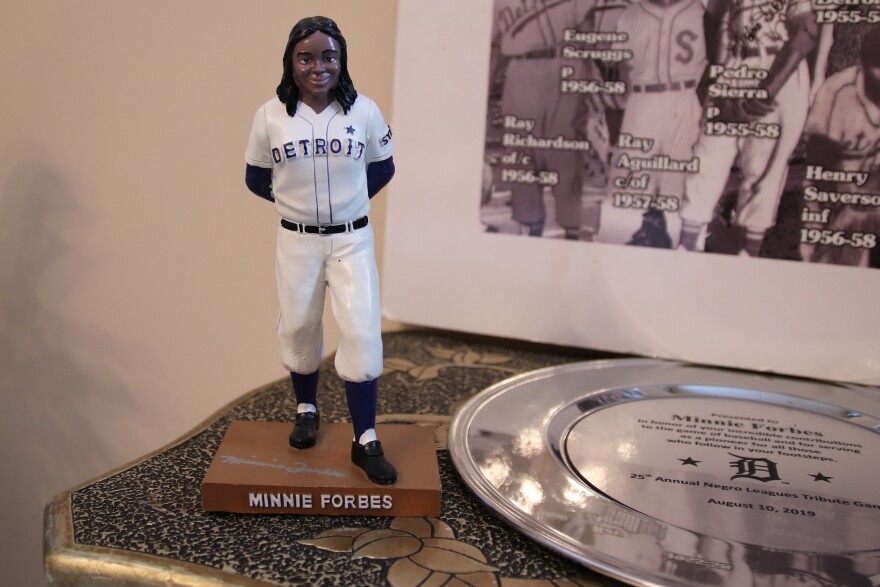
Grand Rapids isn't a big-league baseball town, but a living part of baseball history calls it home.
Minnie Forbes is the last surviving owner of a Negro Leagues baseball team. She owned the Detroit Stars from 1956 to 1958. She was also one of just a handful of female owners.
Michigan Radio reporter Bryce Huffman and I recently visited Forbes at her home on a quiet street on Grand Rapids' east side.
A big move
Forbes was born in Mississippi in 1932. Her family moved to Grand Rapids in 1945 to live with her uncle, Ted Rasberry.
"In 1946, he purchased his own team, which was known as the Grand Rapids Black Sox," Forbes said.
The Black Sox were an African-American minor league team.
"By the time I was 18, I was fully involved as a secretary. We had one of those old typewriters, so I used that to do applications. Later on, I start booking games and games selling tickets when they played. Most of that was for the Grand Rapids Black Sox," Forbes said. "He didn't get involved with the Negro [American] League until 1953, I believe, when he purchased the Detroit Stars."
That was several years after Jackie Robinson joined the Major Leagues. The Negro Leagues struggled as more players followed him. The Negro National League collapsed quickly. In 1956, Rasberry bought the historic Kansas City Monarchs franchise. But the Negro American League wouldn’t allow him to own two teams.
"He said, 'How would you like to own a team in the Negro League?'" Forbes said. "I thought it was funny at first, but ... we talked about it. And that's how I ended up with the Detroit Stars in 1956."
Discrimination off the field
Although fans black and white would come out to see their games, Negro Leagues players suffered great indignities when they left the ballparks.

"The players, traveling, they had nowhere to stay because of the discrimination, so they slept in the buses. And they couldn't go in places to eat. So one person would go to the back door window, whatever, and get food for all the players. And they would end up playing games, maybe doubleheaders or whatever, without sleep or little sleep that they had on the buses. All the trouble that they went through, it shows determination on playing a game they love."
Forbes said it was frustrating for players to know they were as good or better than some of the white players in the Major Leagues.
"But they realized that there would come a day when they would be able to [make it to the big leagues], if they just hold long enough. And some of the players did," she said. "Unfortunately, some of the good players, by the time that the time came, they were too old to play."
From the front office to the hot corner
Forbes was also a softball player for an all-black women's team in Grand Rapids. That gave Raspberry the idea to have her play in a baseball game with the Kansas City Monarchs as a way to help sell tickets when they came to Grand Rapids
"I just wonder if I'm worthy of representing and speaking about the Negro League because when I got involved, things was easier for me than it was for the ones before me." - Minnie Forbes
"He had me on third base that day," she said, smiling. "And I'm wondering if he knew all the hitters were gonna hit the other way."
So, she didn't see a lot of action on third?
"No, and I'm glad I didn’t, because I kept thinking, ‘Oh boy,'" Forbes said, laughing.
Forbes had pulled out some photos and memorabilia from the Negro Leagues, including a shot of her and Raspberry after she signed the contract to take over the Detroit Stars. Forbes was about 25 years old at the time.
"See, I was about to cry. See the tears? I thought ‘Oh no, what am I doing?’"
Forbes got out of baseball a few years later and went into retail. She worked at Jacobson's Stores, a department store company, in Grand Rapids for 39 years.
An unexpected honor
In 2013, President Barack Obama honored Forbes and some Negro Leagues players at the White House.

"I haven't been able to find a word big enough to express how I felt," she said. "That was so exciting and it was a surprise. I got a call one day that we were invited to the White House and I thought it was a joke. And I said, "Oh, okay."
But the invitation was for real. Forbes says meeting the first African-American president made the moment even more special.
"It was just emotional and happy, but that was something that I will always remember."
As time passes, fewer and fewer people who were involved in the Negro Leagues are left. How does it feel to be a living link to that part of history?
"I just wonder if I'm worthy of representing and speaking about the Negro League because when I got involved, things was easier for me than it was for the ones before me."
This story is part of Michigan Radio's Black History Month series on pioneering black Michiganders. Bryce Huffman and Lauren Talley contributed to the series. Sarah Hulett was the editor.
Want to support reporting like this? Consider making a gift to Michigan Radio today.






